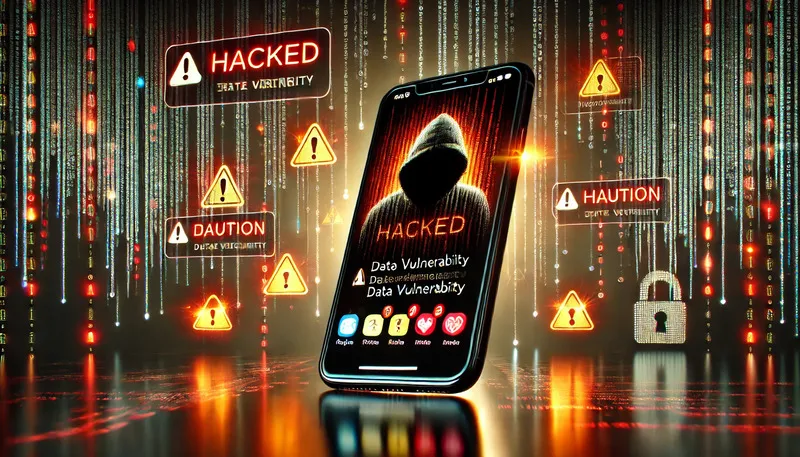7 Signs Your iPhone May Be Hacked: How to Identify Weird Behavior
Initially, you might notice that your battery is depleting faster than usual, leading to endless charging sessions. Soon after, your phone may begin emitting beeps at random intervals and displaying notifications from unfamiliar apps.
But that’s just the start of your troubles.
If your iPhone has been compromised, the situation can become highly frustrating and poses significant risks to your data privacy. A report by Apple in 2022 revealed that they thwarted over $2 billion in fraudulent transactions, underscoring the frequency of hacking efforts, phishing scams, and other security threats targeted at iPhone users.
Are you suspecting that your iPhone has been hacked? Or perhaps you’re considering if you need a VPN for better protection against future threats?

Introduction
Has it seemed like your iPhone has been misbehaving recently? Maybe the battery runs low too quickly, apps crash unexpectedly, or you receive nonsensical messages. These situations could signal something far more troubling—your iPhone could be hacked.
Security breaches are increasingly prevalent, and even Apple’s robust security measures can’t always fend off persistent hackers. If you’re worried about the security of your data, recognizing the signs that suggest your iPhone may be compromised is vital.
Below are the primary indicators to keep an eye on along with actionable steps to protect yourself.
Signs That Your iPhone Might Be Hacked
Initially, you might be tempted to dismiss oddities in your iPhone’s behavior. It could just be a temporary glitch, right? Sadly, brushing off these signs may leave your personal information vulnerable. Here are seven significant warning signs that your iPhone may have been compromised.
1. A Drastic Rise in Data Usage
An unexpected increase in data usage, especially when your habits haven’t changed, might indicate that unauthorized applications are running in the background. Hackers frequently embed malicious software that consumes data, which can lead to increased billing.
2. Unusual “You’ve Been Hacked” Alerts
Notifications or pop-ups claiming your device has been hacked are often fraudulent. Shadows of hackers utilize these deceptive messages to induce fear, coaxing you into clicking on malicious links to gain further control over your device.
3. Inability to Access Your Apple ID
If you’ve unexpectedly lost access to your Apple ID or are met with alerts indicating that someone else has logged in from another device, this could be a strong sign of account compromise. Hackers may take over your Apple ID, resulting in unauthorized purchases or undesired changes to your settings.
4. Camera or Microphone Indicator Activates
Noticing that your microphone or camera indicator lights up without any input from you is concerning. Cybercriminals could use malware to secretly access your iPhone’s camera or microphone for surveillance.
5. Sudden Flood of Ads and Pop-Ups
If you find yourself inundated with advertisements or pop-ups, particularly when not actively using any apps, this is a telltale sign of malware. These ads may aim to redirect you to dubious sites or entice you to unknowingly download further harmful software.
6. Slow Performance and Battery Drain
If your phone seems to lag or your battery drains at an alarming rate, it may suggest that malware is working in the background, utilizing your device’s resources without your awareness. Such malware could be collecting information or attempting to communicate with external servers.
7. Sending/Receiving Unwanted Messages or Calls
Have your friends or family mentioned receiving strange texts or calls from your number that you didn’t send? This can occur if hackers commandeer your phone to distribute phishing messages, seeking to steal private information from your contacts.
Steps to Take If You Suspect Your iPhone Is Hacked
If you suspect your iPhone has been hacked, here are a few essential actions to regain control:
- Immediately change your Apple ID password.
- Remove any suspicious apps that you may not have installed yourself.
- Ensure your software is updated with the latest iOS version to patch security gaps.
- Reset your iPhone to factory settings if you’re unable to eliminate the malware manually.
The Importance of a VPN for iPhone Security
If you’re anxious about the possibility of your iPhone being hacked, utilizing a VPN (Virtual Private Network) is a highly effective measure to safeguard your data. Although the Apple App Store is generally secure, vulnerabilities can still lurk within legitimate apps. A VPN enhances your device’s security by obscuring your IP address and encrypting your internet activity.
Ways a VPN Aids in Preventing Hacks
1. Conceals Your IP Address
Hackers exploit your IP address to initiate attacks, monitor your online behavior, or even pilfer your personal data. By using a VPN, you mask your IP, significantly complicating the efforts of cybercriminals to target you.
2. Protects Your Data on Public Wi-Fi
Public Wi-Fi networks are a veritable playground for hackers. Without a VPN, your data may be intercepted while using free Wi-Fi at locations like airports or cafes. A VPN encrypts your connection, safeguarding against unauthorized access to your sensitive information.
Extra Tips for Securing Your iPhone
- Activate Two-Factor Authentication (2FA) for your Apple ID.
- Regularly update your software to shield against known vulnerabilities.
- Steer clear of jailbreaking your iPhone, which can disable crucial security features.
- Exercise caution when downloading apps, opting solely for trusted sources.
Conclusion
If your iPhone exhibits strange behaviors, addressing the issue promptly is essential to prevent further complications. Whether it’s unusual data consumption or erratic notifications, these could serve as warning signs of a potential hack. By remaining vigilant and utilizing tools such as a VPN, you can better protect your personal information from threats.
Image Credit: Pcmobitech.com